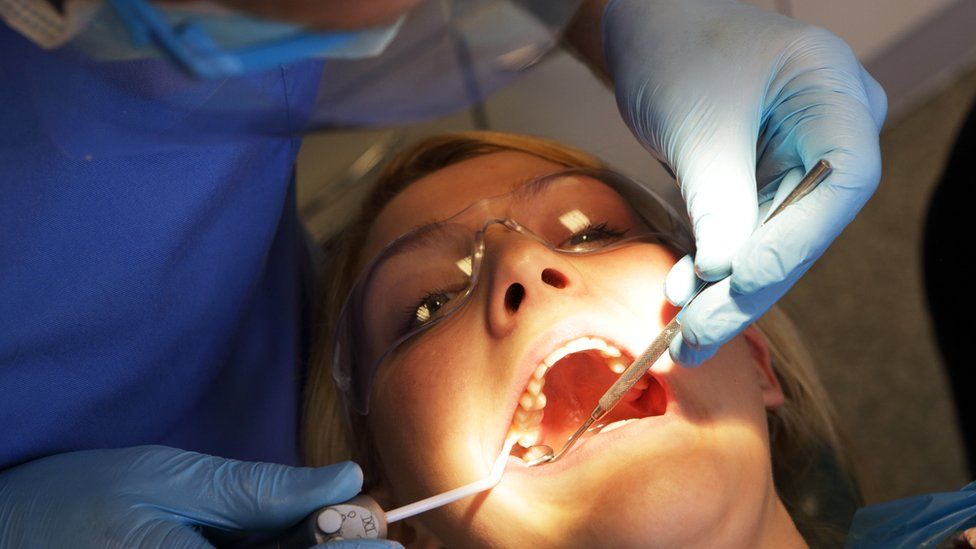ARTICLE AD BOX
 Image source, Getty Images
Image source, Getty Images
By Nick Triggle
Health correspondent
Dentists will be offered a £20,000 bonus to work in the areas of England with the poorest access to NHS care.
The payment - dubbed a golden hello - will be available to up to 240 dentists, about 1% of the workforce.
It is part of a wider plan by the government to improve access to NHS dentistry, and includes top-up payments to all dentists to take on new NHS patients.
But dental leaders say the measures do not go far enough.
The state of NHS dentistry was recently thrust into the spotlight when hundreds of people queued outside a new dental practice in Bristol to register as NHS patients.
And a BBC investigation in 2022 found nine in 10 NHS dental practices across the UK were not accepting new adult patients for treatment on the NHS.
It found the lack of NHS appointments had led people to drive hundreds of miles in search of treatment, pull out their own teeth without anaesthesia, or resort to making their own improvised dentures.
'Plan will help'
While the golden hello is aimed at getting more dentists to work for three years in the so-called dental deserts where there is the poorest access to NHS care, the top-up payments will be crucial to improving access across the board.
An extra £15 will be given to dentists on top of the standard payment of £28 for seeing a patient who has not visited a dentist for two years.
If the patient needs more complex work, the cash incentive will increase to up to £50.
The government hopes the incentives will lead to another 1.5 million treatments being given over the next 12 months.
Last year 32.5 million were carried out - but that is still fewer than before the pandemic.
Achieving that depends on tempting current dentists into doing more NHS work instead of private work - something the British Dental Association (BDA) does not think is guaranteed.
Dentist training posts are in the process of being increased, but that will take some years to start making a significant difference.
Image source, Getty Images
Health Secretary Victoria Atkins said she recognised how frustrating it was not being able to access an NHS dentist.
"I'm determined to deliver faster, simpler and fairer access to NHS dentistry for patients. This plan will help."
To support the proposal, an extra £200m will be invested on top of the £3bn currently spent each year.
But the BDA said this did not go far enough, pointing out spending had dropped by £1bn since 2010 once inflation was taken into account.
BDA leader Shawn Charlwood accused ministers of "rearranging the deckchairs".
"This 'recovery plan' is not worthy of the title. It won't halt the exodus from the workforce or offer hope to millions struggling to access care.
"Nothing here makes this service fit for the future.
"The crisis will remain a burning issue in communities across this country until we get real change."
Louise Ansari, head of Healthwatch England, said there were "major access issues", which the rising cost of living had also had a big impact on.
She the plan was a "good start", but in the long term more radical solutions were needed.
Pulling own teeth out
Alongside the cash incentives, the plan includes other steps.
Dental teams will travel to schools and nurseries to provide fluoride varnish treatments and supported teeth-brushing.
Mobile dental services will also be targeted at rural and coastal areas, while water fluoridation will be expanded to new parts of the country to help prevent tooth decay.
It comes after Labour announced its own policy of supervised teeth-brushing for three-to-five-year-olds.
The party has also previously said it would offer incentives for new dentists to work in areas with the greatest need.
Shadow health secretary Wes Streeting told the BBC: "After 14 years of Conservative neglect, patients are desperately queuing around the block to see a dentist, literally pulling their own teeth out, and tooth decay is the number one reason for six-to-10 year-olds being admitted to hospital.
"The Conservatives are only promising to do something about it now there's an election coming."
Related Internet Links
The BBC is not responsible for the content of external sites.

 1 year ago
413
1 year ago
413








 English (US) ·
English (US) ·